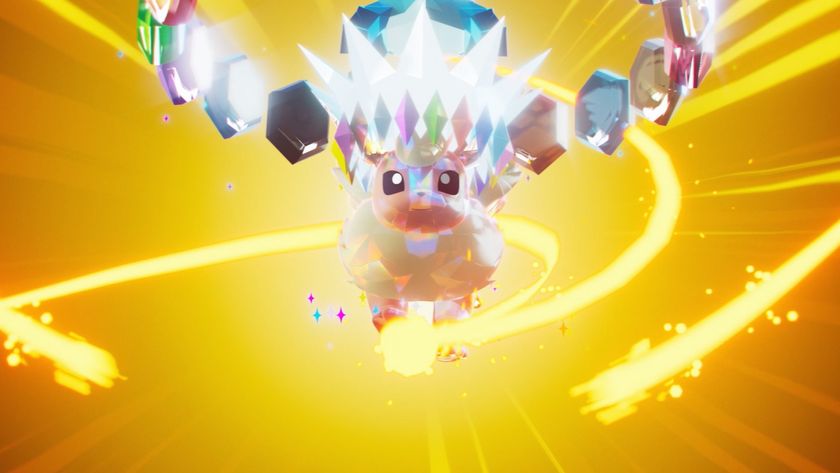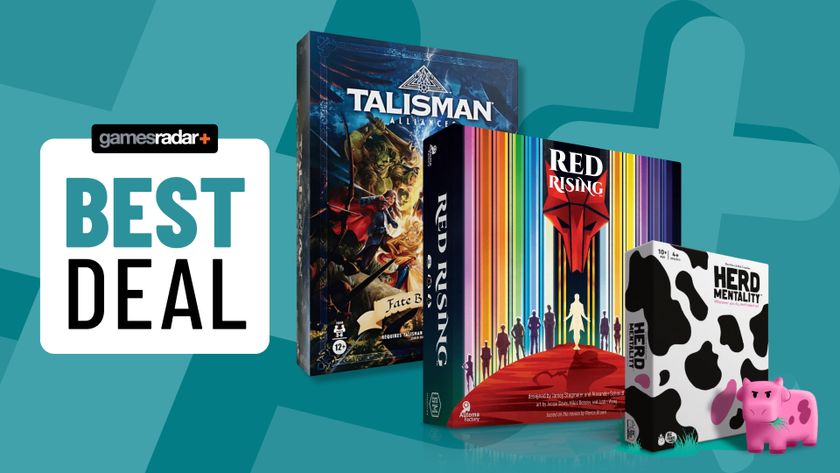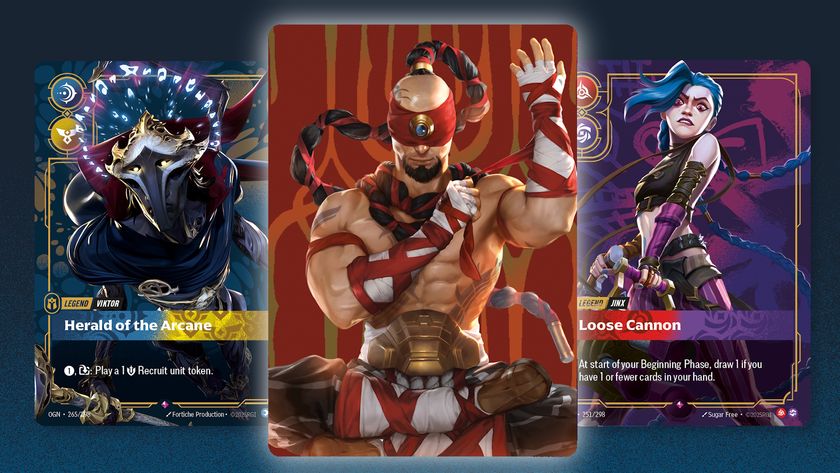The 6 best cooperative board games to team up with in 2025
Play nice and work together
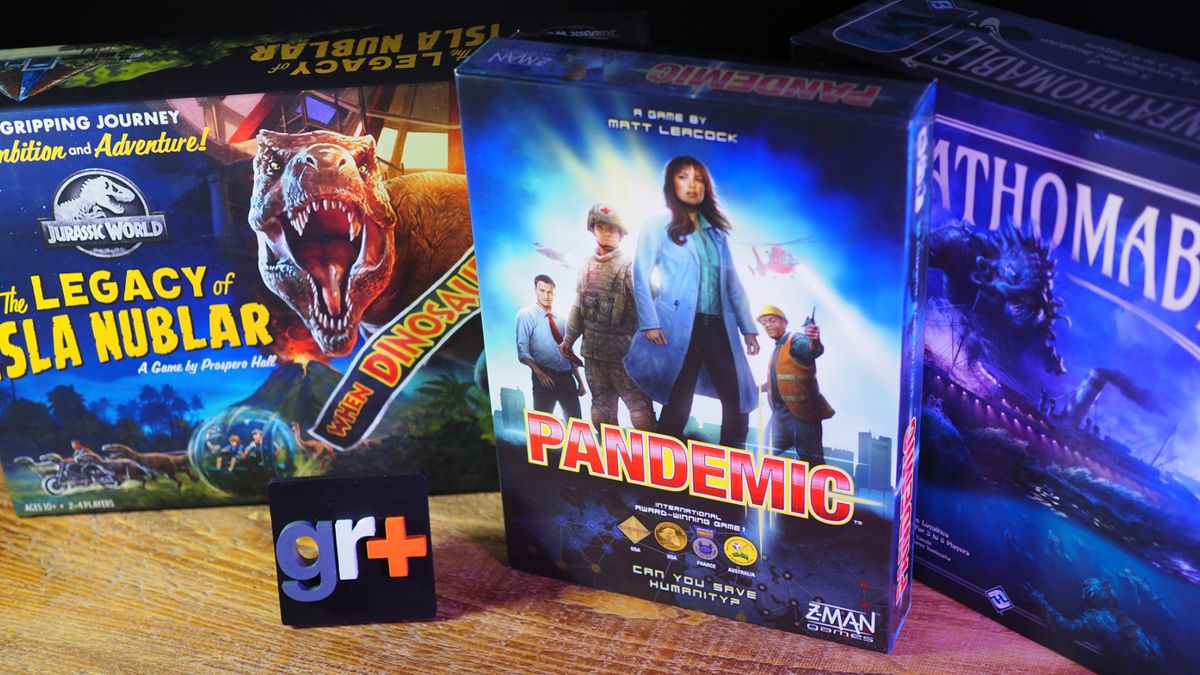
If you're not a fan of how competitive things can get around the table, cooperative board games will be a breath of fresh air. Besides emphasizing teamwork and good communication, they also have a wholesome vibe you'd struggle to find anywhere else. You win or lose as one, and that has a habit of bringing us all together.
The trouble is, there's a lot of choice. That's why the 12DOVE experts and I have gotten our heads together to form this list of the best cooperative board games. If you ask us, these should be on everyone's shelf. In fact, a few of them rank amongst the best board games overall – they stand out in a very crowded field, which helps if you're wondering how to choose what you should play next. Pandemic is still head and shoulders above the rest thanks to intense gameplay that forces you to think on your feet, for example, and it's my go-to suggestion.
Wondering how we settled on these recommendations? Our team and I have had hands-on experience with all of them, and I've reviewed more than a few for this site. Basically? If we don't think it's the best of the best (and we wouldn't be happy spending our own money on it), it's not getting onto the page. You can find out more about our process in the 'how we test' section later on.
Recent updates
This page has been updated with an all-new honorable mentions sections as of 02/27/25. It includes three entries per listing, with an explanation of why they're worthy additions for someone's collection.
The quick list
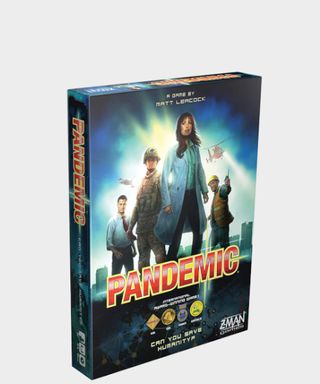
There's a reason why Pandemic has endured for so long; it's exquisitely well-designed. Thanks to a race against time where every decision counts, teamwork, communication, and a good battle-plan is essential if you want to win. This is everything that good cooperative board games should be.
Read more below
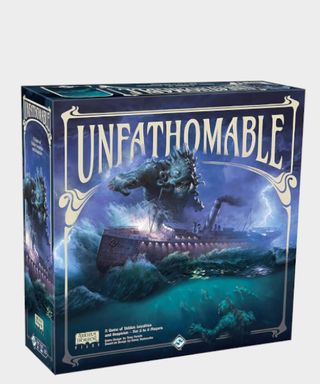
Want to take things up a notch? Throw traitors into the mix. This game pits two teams (humans trying to save their ship and villainous 'hybrids' that want to sink it) against each other, but nobody knows who's who. What follows is a gripping few hours of paranoia, deception, and comradery that ranks amongst the best.
Read more below
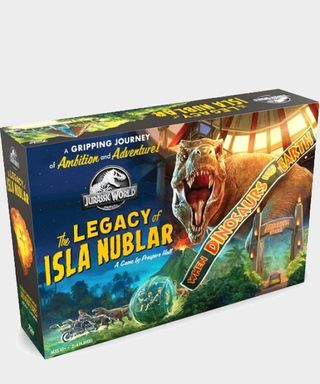
Because the results of each session carry into the next in this excellent co-op game, your choices matter – and it's easier to have an impact with just two players.
Read more below
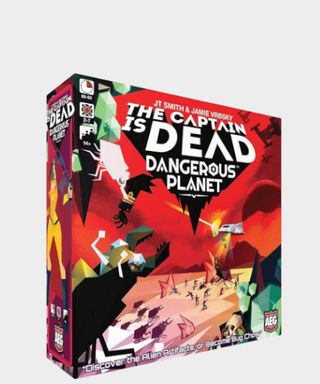
If you know your way around co-op board games and love a bit of tactical jiggery-pokery, Dangerous Planet ticks all the boxes; its tower-defense mechanics give you plenty to juggle. It's also a genuine challenge that'll keep you coming back for more.
Read more below
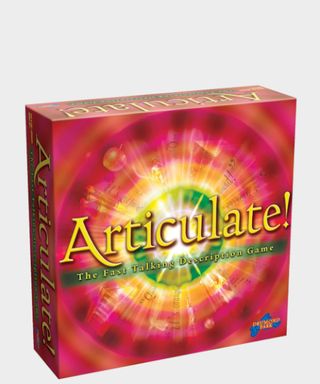
Are family-members descending en-masse? Break out this classic board game. For starters, it's dead easy to understand - it's like charades, only faster-paced. Secondly, its questions are broad enough that they don't go 'out of date.'
Read more below
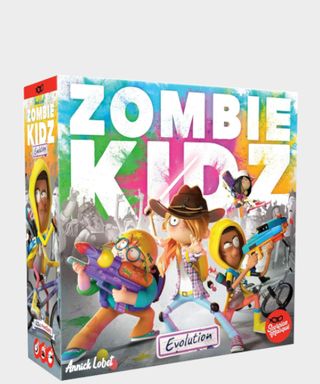
Alongside a brilliantly silly premise (beat the undead to avoid eternal detention as a zombie), this game's emphasis on forward thinking and upgrades that follow you from session to session help it stand out from the crowd.
Read more below
Best cooperative board game overall
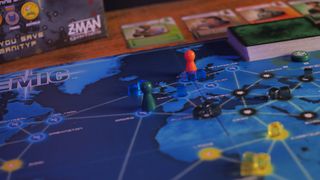
Specifications
Reasons to buy
Reasons to avoid
If you want the ultimate co-op experience, this is where you should start. Although the theme hits closer to home nowadays, Pandemic remains one of the best cooperative board games ever made thanks to how essential teamwork and strategizing are. Defeat is always a possibility, and victory hinges on your ability to communicate well.
Indeed, Pandemic has been going strong for a couple of decades now. That's not surprising when you consider how watertight its mechanics are; there's no wasted space in terms of gameplay, and you can keep coming back time and again.
✅ You want a gripping co-op game: Squabbling over first place can be a drag, particularly if other players are very competitive. That's why Pandemic's emphasis on teamwork is so welcome – communication and strategizing together is essential if you want to win.
✅ You're looking for a challenge: This isn't an 'easy' game by any means, so it feels incredibly satisfying to beat. If you want a challenge, don't miss Pandemic.
❌ You don't like pressure: Tension is a key component of Pandemic as you struggle against the odds, so those who don't cope well with pressure may not have as much fun.
❌ You want something easy: Pandemic can be a challenge to win (as gratifying as that is), so it's not for anyone wanting an easy, breezy experience.
Features & design: With four deadly diseases having broken out across the globe, your job is to cure and eradicate them before civilization becomes overwhelmed. Unfortunately for us, those illnesses – represented by little cubes placed on city spaces around the board – spread faster than you can say "hazmat suit." They also grow more dangerous with each passing turn, because too many will cause a domino effect. Pandemic then turns into a race against time in which every decision counts.
Speaking of which, the hardest choice you'll have to make from turn to turn is whether you research a cure (which eventually stops new cubes for that disease being placed) or removing those infection cubes to avoid an outbreak spilling over into the next space.
There isn't much to visually distract you from your task; Pandemic is to the point in how it looks. It does so with style, though. The board and cards feel like graphics you'd get on-screen in CSI shows where someone says something very dramatic before the scene cuts to black with a music sting. Sure, the movers representing your characters are basic by comparison (they're simple plastic pawns). But everything else is highly effective thanks to that restraint.
The only downside? Those disease cubes look all too delicious – they're like tiny, forbidden sweets.
Gameplay: Yes, this is a pressure-cooker situation. But luckily, the result is a blast from start to finish. With a laser-focus on strategy and coordination, Pandemic is the definition of good teamwork. There are no awards or pats on the back for individual players; it's all for one, and one for all.
It's true that the game is difficult, and a little stressful at times. Getting unlucky with the cards you draw can, on a rare occasion, mean early defeat that isn't your fault. Yet Pandemic is also engrossing in a way few other co-op board games manage to be. It keeps you on the edge of your seat at all times. It's the game I always come back to if I'm in the mood for something team-based.
Criteria | Notes | Score |
|---|---|---|
Game mechanics | Few cooperative board games achieve such a fine balance of tension, strategy, and teamwork. This is how it's done. | 5 / 5 |
Accessibility | While it's not a party game by any means, Pandemic isn't all that hard to understand. The challenge comes from its difficulty. | 3 / 5 |
Replayability | Because infections appear at randomly-selected locations and can trigger a near-infinite number of possibilities from there, you'll rarely repeat yourself. | 5 / 5 |
Setup and pack-down | It's not a massive headache to lay out, but you do have to place numerous 'disease' cubes after drawing cards to work out the world-state. The spread of cubes means you'll have a lot more to put away by the end, too. | 3 / 5 |
Component quality | Whether it's an aesthetic seemingly inspired by CSI thrillers or dozens of mesmerizing little cubes (AKA forbidden jellies), this game is as good-looking as it is well-made. | 5 / 5 |

"Few co-op board games are able to match how closely – and how well – teamwork is tied into the experience, either. The two are inextricable, and Pandemic is all the more memorable for it." Read more: Pandemic review
Honorable mentions
Why you can trust 12DOVE
Load honorable mentions ↓
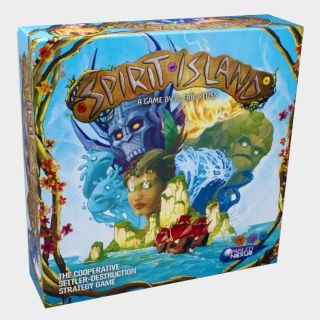
Few co-op games have a better reputation than this one. Many games challenge you with colonizing the board, but Spirit Island flips the script and demands that you defend it from invaders instead.
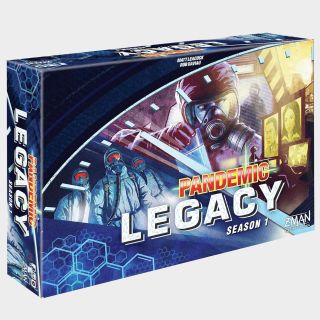
This works as something of an upgrade to the original Pandemic; it connects matches into a long-term campaign where your choices follow you from session to session. If you have the time, it's the ultimate version.
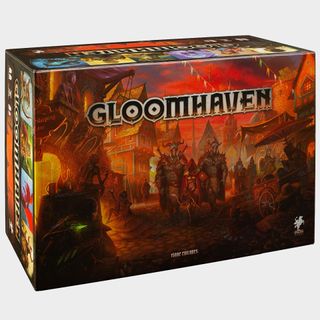
Fantasy stories are crammed with found-family, and Gloomhaven lets you live out that dynamic. This sprawling dungeon-crawler is the kind of game where the consequences of your actions follow you – the world changes around your party.
Best cooperative board game for adults
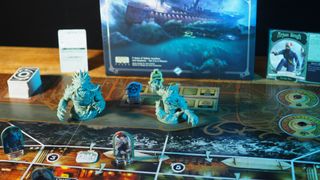
Specifications
Reasons to buy
Reasons to avoid
If you want to make sure everyone stays on the edge of their seat, throw traitors into the mix. Unfathomable does this to great effect, and the result is good. Monstrously good, you could say.
Sure, it's not going to be for everyone. It's quite lengthy and there are many moving parts mechanically speaking. But Unfathomable is a great choice if you have a regular board game group looking for new challenges they can keep coming back to. There's so much you can get your teeth into here, and its hidden role systems are peerless.
✅ You love deception games: If you're a fan of social deduction games like Mafia, you'll get on well with this one. Being able to fly under the radar – or sniff out traitors – is a key part of the experience.
✅ You enjoy cosmic horror: Seeing as Unfathomable takes place in Lovecraft's Cthulhu Mythos (which means it's tied to the Arkham Horror series), it's perfect for fans of incomprehensible terrors.
❌ You're short on time: This game's runtime is as monstrous as its villains, so Unfathomable may not be for you if you don't fancy spending three to four hours at the table.
❌ You want something straightforward: There's a lot to learn here, so you'll need to spend time swotting up to get the most out of Unfathomable. It's a great co-op board game, but won't be for everyone as a result.
Features & design: The year is 1913, and some very unlucky passengers have booked onto the SS. Atlantica for a voyage across the ocean. A couple of days from port, things go horribly wrong; bug-eyed sea creatures rise from the ocean and attack, directed by eldritch behemoths. Your objective is to keep the ship afloat, survive those monsters scrambling on board, and reach safety before it's too late.
Well, that's true for most people. Although the majority of players are bog-standard humans trying to fix damaged parts of the ship or fend off these 'Deep Ones,' others are secret human-Deep One 'hybrids' hell-bent on sabotaging their efforts. They do this by scuppering 'crisis' challenges that are randomly drawn each turn. All of these have a target number and consequences should you fail to meet said number, so players must contribute numbered cards from their hand to a central pool. Because this is done anonymously, traitors can add a dud card to tank the whole effort before playing innocent. The humans can't trust anyone as a result, and thanks to teamwork being your only hope of keeping this vessel running, it's a juicy dilemma.
The visual design is just as evocative. With moody artwork working alongside art-deco flourishes that make the board, rules, and cards seem as if they've been pulled from a 1920s shipwreck, Unfathomable knocks it out of the park so far as looks are concerned.
OK, so I was left a little cold by the horde of mono-pose Deep One models. Yet their eldritch masters make up for it in spades. These enormous figures are showstoppers in their own right, and they add a sinking sense of "oh crap" whenever they emerge onto the board.
Gameplay: This is the spiritual successor to an excellent, now-out-of-print Battlestar Galactica board game from the 2000s, and even though it's set in the Arkham Horror universe these days, Unfathomable keeps hold of the same fantastic gameplay. Traitors must stay undetected while they mess with rivals, and humans have to sniff them out as they juggle monster-fighting with white-knuckle repairs. Despite resulting in a ballooning run-time, it's a worthy trade-off if you've got patience.
For one thing, it's a thrilling test of nerves and communication as you juggle an eternally-growing to-do list. Plus, there are enough crises included in the game to keep things fresh and encourage return visits. However, the best bit is how Unfathomable balances the strategic depth of board games for adults with the cheeky glee of undermining your friends. Honestly, I'm always delighted when I get to throw a spanner in the works. It's a winning mix.
Criteria | Notes | Score |
|---|---|---|
Game mechanics | The way this game handles hidden roles and slowly mounting odds is magnificent. Its character backstories and overall mechanics are brilliantly woven together as well, making for a cohesive narrative experience. | 5 / 5 |
Accessibility | It'll take you a run-through or two to properly master Unfathomable – there's a lot going on. However, the effort is worthwhile. | 2 / 5 |
Replayability | This game plays out very differently depending on the characters you've chosen, who's a traitor, which events you draw, and more, so there's always something new to see. | 5 / 5 |
Setup and pack-down | Because there are so many systems at play here, Unfathomable will take a while to set up and put away. | 3 / 5 |
Component quality | From the 1920s theming to exquisitely detailed models, this game is gorgeous. It feels as premium as it is, too. | 5 / 5 |

"Despite being massive in scope and a little daunting, Unfathomable is worth the investment. This is a cooperative board game cut from the same cloth as Pandemic thanks to edge-of-your-seat gameplay, but is spiced up with a heady dose of deception." Read more: Unfathomable review
Honorable mentions
Load honorable mentions ↓
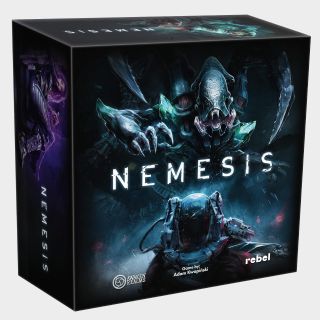
Even though it's only 'semi' cooperative, Nemesis still excels as a team-based experience. Because everyone has secret objectives (some of which help and hinder the group), it's tough to know who you can trust.
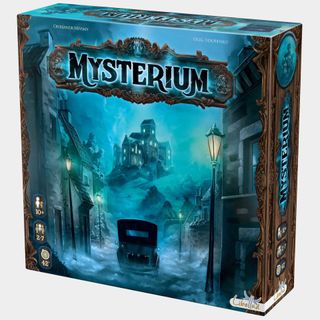
If you want a co-op board game that does things differently, try this spooky outing. Your goal is to solve a murder… but the victim (e.g. a player) attempts to provide clues from beyond as a ghost.
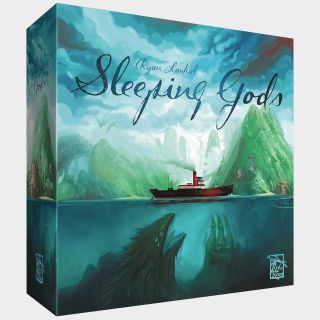
Much like its eerie cover art, this story-rich exploration game is deeper than you'd think. It sees you globetrotting across a strange world to awaken deities that can send your lost ship home, and its setting reacts to your choices.
Best 2-player cooperative board game
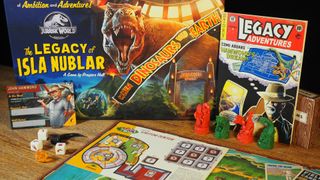
3. Jurassic World: The Legacy of Isla Nublar
Our expert review:
Specifications
Reasons to buy
Reasons to avoid
Most of us have probably made jokes about how terrible Jurassic Park security is at one point or another. After all, how hard can it be to stop your star attractions from eating everyone? This team game lets you put that to the test by running the dino-park yourself.
Even though it's still brilliant with more people, running it as a 2-player board game is also much better – you get more choice, and it's easier to leave your mark.
✅ You want a collaborative game with consequences: Because this is a 'Legacy' board game, your choices don't cease to matter once the session is over. Instead, they carry into the next game and beyond. Changes you make are permanent, so the experience is uniquely yours.
✅ You enjoy Pandemic or Horrified: For anyone that loves two of the best cooperative board games out there, take note – this cribs bits of both for something incredibly compelling.
❌ You can't commit to multiple sessions: Legacy games can take a long time to finish, so don't think of this as a 'one and done' sorta deal.
❌ You don't like the idea of permanently changing your board: If altering your board with stickers makes your skin crawl, be warned – there's a lot of that in Legacy of Isla Nublar.
Features & design: At its most basic, Legacy of Isla Nublar lets you play through the story of each movie (along with a few scenarios set between them). Your aim is to do better than the characters on-screen, and the first priority is keeping guests safe if and when dinos run amuck.
Making sure they stay in line isn't easy. For starters, your prehistoric residents will do their best to break through any barriers you've erected. Secondly, predators will make a beeline for anything on two legs… and you've got to protect those poor saps while completing objectives that are probably going to drag you in the opposite direction. When combined with legacy mechanics that allow you to erect permanent structures on the board or create your own dinosaurs with gene-splicing, this Jurassic World spin-off elicits the same excitement you might have felt when seeing those park gates open (complete with that score) for the first time.
Actually, you'll get a whiff of that as soon as you open the box. This team board game is one of the few I'd describe as genuinely sumptuous. Its rulebooks and cards have been designed to look like pulp comic books from the 20th Century, and elements like the board sport 'wood-trim' effects along with a vibrant color scheme to bring the best classic board games to mind.
There are plenty of other flourishes, too. For one thing, the d20 die included here evokes prehistoric mosquitoes trapped in amber. Plus, those dinosaur tokens would look amazing on a shelf as is – they're miniature dioramas pulled straight from the movies.
Although you are paying for all this in a literal sense with the higher price tag, Legacy of Isla Nublar pulls overtime to make that investment worthwhile.
Gameplay: This is the kind of board game where things can go wrong fast, and it's gloriously chaotic. As an example, I was cornered once by a T.rex while organizing the gift shop as geriatric park founder John Hammond, and all I had to fight it off was a measly cattle prod. It was ridiculous and wonderful at the same time, and Legacy of Isla Nublar is stuffed with emergent gameplay like that. You'll always have to compromise as well, because your objectives deliberately make you choose between the mission and saving civilians.
No matter how you go about it, tackling Legacy of Isla Nublar as a pair makes for a more satisfying time. Because you'll be permanently altering the board with barrier stickers, buildings, and more, limiting head-count affords you greater agency when it comes to those decisions. This does mean commiting to a long-term campaign for the full effect, but sticking with it provides a unique board for use in an endgame mode you can revisit over and over again. Few other legacy games do this, and fewer still have mini-games to keep things interesting, so that's a tick in the 'win' column right away.
Criteria | Notes | Score |
|---|---|---|
Game mechanics | This is a pick-n-mix of board gaming's best ideas, and I'm not complaining. When you combine systems inspired by Pandemic, Horrified, and more, you get magic. | 5 / 5 |
Accessibility | Seeing as it's a Legacy game (consequences follow you from session to session), there's a greater level of complexity here. However, it's still surprisingly accessible nonetheless. | 3 / 5 |
Replayability | In a much-appreciated departure from most Legacy games, you can keep coming back to this one thanks to an endlessly replayable endstate – you wind up with your own unique board game. | 4 / 5 |
Setup and pack-down | There's a lot of 'stuff' to work through here, and each session will provide its own components, so the process is more involved. | 3 / 5 |
Component quality | They spared no expense with this one. It feels like a million dollars, and looks like it as well. | 5 / 5 |

"This game breaks out plenty of ideas we've seen before (hidden mechanics that are unlocked as you go, branching upgrade trees, and board changes), but they're all executed to perfection. Additions like spot-on theming and incredible production values cement it as a worthwhile addition to your collection too, even if your shelves are packed enough to give off 'board game cafe' vibes."
Honorable mentions
Load honorable mentions ↓

Seeing as it won an award from the highly prestigious Spiel des Jahres (the industry's most sought-after gong), Sky Team has plenty of clout behind it. This is a clever, engrossing co-op experience that does something different.
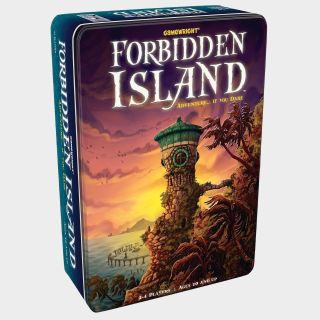
This clever game is very similar to Pandemic mechanically speaking, so it comes highly recommended if you enjoy co-op experiences. Your aim is to grab treasure from a sinking island, and it's a tense race to the finish.
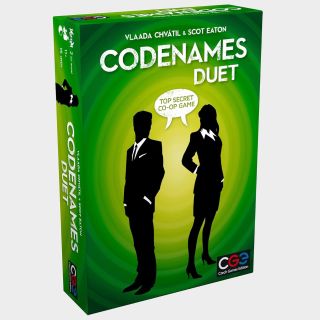
Codenames is one of those classic party games that many tabletop fans praise, so the dedicated two-player version is an easy recommendation. It's definitely worth considering if you struggle to find enough players for the OG game.
Best cooperative strategy board game
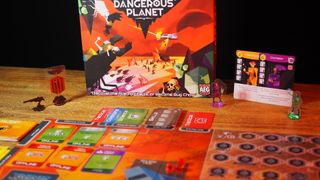
Specifications
Reasons to buy
Reasons to avoid
It's a well-known fact that Star Trek redshirts are doomed, but they're your only chance of survival in The Captain is Dead: Dangerous Planet. As the franchise's third installment, it builds on the existing formula in clever, compelling ways. But don't think you need to have played its predecessors (The Captain is Dead and The Captain is Dead: Lockdown) to enjoy yourself. Thanks to push-your-luck mechanics and a generous amount of depth, this is one of the best cooperative board games from the last few years if you're a fan of strategy.
Tongue-in-cheek nods to Trek will delight fans as well. This co-op board game clearly adores the series yet will poke gentle fun at its quirks, so it should always put a smile on your face even if you're being beaten to a pulp by bugs.
✅ You want a challenge: This game isn't messing around. It can be genuinely hard if you don't play your cards right (and even if you do, depending on the difficulty level), so players with a tactical mind will find plenty to get their teeth into.
✅ You love tower defense games: Boil it all down and you'll find an incredibly well-made tower defense exercise propping this game up. Does that sound like your idea of fun? If so, you'll appreciate this.
❌ You want to switch off your brain: Dangerous Planet requires lots of brainpower to overcome. Want a quiet, chilled-out night in? This isn't the one for you.
❌ You get frustrated easily: Seeing as this co-op board game can be tricky, those without patience may struggle to find all that gold under the surface.
Features & design: As the name would suggest, the commander of your away-mission has been killed in action. (Boo.) Now you've got to complete their quest and gather as many alien artifacts as possible before you're overwhelmed by the planet's bug-like inhabitants. (Yay?) Naturally, there's also a catch – those artifacts are hidden deep in bug-infested tunnels. Want to collect 'em all? You'll need to venture further into enemy territory.
Due to newly-hatched bugs scuttling toward you each and every turn, you'll have to set up defenses unless you want a particularly short match; they'll wound your characters and destroy your shuttle should they break through. This results in a ticking clock, especially thanks to bugs moving faster when you've collected more artifacts.
With all this Trek-adjacent tomfoolery, I wouldn't have been surprised for Dangerous Planet to ape that art style as well. But to the game's credit, it doesn't. Even though its heroes are deliberately reminiscent of archetypes or actual The Next Generation characters, they're rendered in an angular way that's totally unique. The Captain is Dead has an instantly recognizable style as a result.
Its components are equally well thought-out, and the use of clear plastic for movers should keep things in tip-top condition for years to come. It's true that there are issues (besides having a lot to set up, it can be hard to see the clear plastic discs you put on the board during play), yet these pale in comparison to the design team's bold choices elsewhere.
Gameplay: Dangerous Planet has plenty in common with the best cooperative board games, and that's no bad thing. It boasts a randomized board and objective placement like Betrayal at House on the Hill (albeit with less flashy tiles), so you'll always have to dream up new plans of attack. It gets harder the further you go as well, just like Pandemic.
And boy, can it get difficult. Thanks to 'alert' cards arranged by color and severity, these random events occur at the end of your turn and are designed to keep you on your toes. This means you'll be walking a tightrope-thin line between victory and defeat, so engineering a cunning strategy or outmaneuvering this devious game feels like an achievement. We'll admit that there are some stumbling blocks via hard-to-absorb rules and a few confusing cards, but these niggles are a small price to pay.
Criteria | Notes | Score |
|---|---|---|
Game mechanics | This game boldly goes… well, we've been here before, but it's rarely been managed better. This is the piece de resistance of tower defence. | 5 / 5 |
Accessibility | There's a lot to think about in Dangerous Planet, and deliberately so – trying to spin all those plates is part of the challenge. That does make it more complex, though. | 3 / 5 |
Replayability | Although you may eventually become bored of the core loop, the wealth of upgrades, characters, and challenge levels mean that won't happen for a long time. | 4 / 5 |
Setup and pack-down | Thanks to the modular tunnel tiles, a treasure trove of tokens, and different components for different difficulties, you won't be able to set this up on autopilot. | 3 / 5 |
Component quality | The Captain is Dead series has an incredibly distinct and compelling art style, coupled with smart design choices that mean it should last. | 4 / 5 |

"This game is as deep as the tunnels beneath its titular planet. There are many, many different ways to go about it, and a wealth of options stop this threequel from becoming stale. It's tricky enough that winning is a legitimate thrill, too; Dangerous Planet is hard, though not in an annoying way." Read more: The Captain is Dead: Dangerous Planet review
Honorable mentions
Load honorable mentions ↓
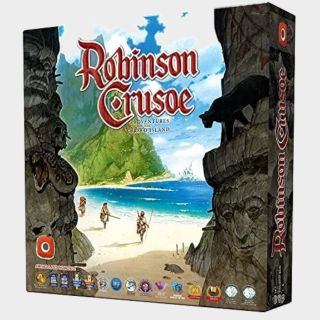
I've heard great things about this survival game, and it's the kind of experience that will punish anyone who doesn't plan ahead. Make sure you bring your wits and teamwork with you for this one.
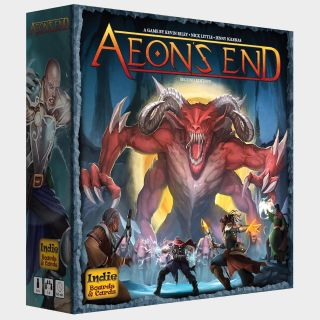
This deckbuilding game is often touted as one of the best cooperative experiences out there, and thanks to mechanics that require careful planning, it's one strategy fans should get a real kick out of.
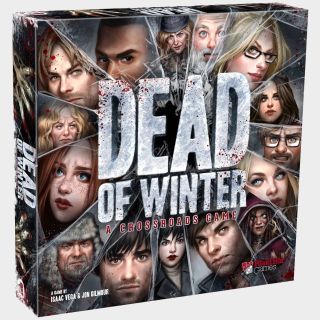
A zombie apocalypse has ruined everyone's day in this atmospheric strategy game, and it forces you to contend not just with hordes of the undead… but the monstrous survivors who've been left behind.
Best cooperative board game for families
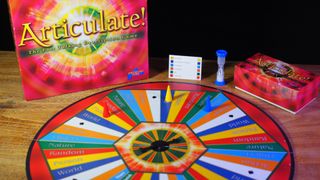
5. Articulate
Our expert review:
Specifications
Reasons to buy
Reasons to avoid
Looking for good co-op board games that you can play en-masse? This is an excellent choice. Up to 20 people can take part in Articulate so long as you've got even team numbers, and countless people have been enjoying the brain-teasers that follow since 1992. Better yet, it doesn't really go 'out of date' in the way its competition does.
Anyone can get involved too, so it's something of a one-size-fits-all for get-togethers. Perfect if you've got teams ranging from granny to grandkids, in other words.
✅ You have loads of players: You can get 20 or more people involved with Articulate, so it's ideal for parties or if you have a lot of family that want to play.
✅ You want a game anyone can play: You don't need to be a trivia master to get on with Articulate – it focuses on more general knowledge. It's a bit like charades as well, which means most of us can fumble our way through.
❌ You want strategy or depth: There aren't any tactics behind Articulate – it does what it says on the tin and is pretty casual.
❌ You struggle under pressure: Each player has 30 seconds to describe as many cards as they can, and that's surprisingly intense. If you don't want to be in the spotlight, you won't like this.
Features & design: After dividing into teams, a representative of one will draw a card. They then have 30 seconds to describe the item listed on it as best they can without using those exact words. (So for 'potato' you might say "you make fries with it!") If their teammates guess what the original word was, whoever's reading them out can take another card – and so on – until their time is up. You then move your token that many spaces along the board.
That board is where things get interesting. Each space has a different category on it for you to tackle (from Nature to People), and some actually give you bonus moves… or let you push rivals back a space.
Well, the gameplay is interesting at least. The rather pedestrian visuals of Articulate let it down, and although they're perfectly serviceable, it feels basic rather than elegant. This is a co-op board game that could do with a makeover.
Gameplay: The biggest draw for Articulate is that anyone can play. There's no need to be a font of obscure facts here, because it's all about general knowledge (which is why it stays relevant, incidentally). That means everyone is able to get involved, no matter how much experience they have with board games.
You'd be right to say that it's not high-octane, or especially strategic. But Articulate's simplicity is in its favor. You can pick it up with ease at any point, and you won't spend an age setting things up. Additionally, it has so many cards with so many categories that you're unlikely to learn them all. I've been playing this for well over a decade, and I'm still not bored of it.
Criteria | Notes | Score |
|---|---|---|
Game mechanics | There's an elegance to Articulate's simple mechanics, and that's probably why it's still doing business decades after hitting shelves for the first time. Strategy fans may find it wanting, but as an easy-going party game it excels. | 4 / 5 |
Accessibility | Anyone can get the hang of Articulate thanks to its charades-style gameplay, and the absurd player count means no-one will be left out either. | 5 / 5 |
Replayability | There are so many cards – each with so many options – that you won't run out of prompts any time soon. | 5 / 5 |
Setup and pack-down | Articulate does have a board and tokens for each team, but beyond that, it's pretty self-contained (cards stay in their box until used). That means it's dead easy to put away again. | 5 / 5 |
Component quality | This is a meat-and-potatoes game in terms of visual design, and its board will start to show wear after repeated use. The spinner is also a bit fragile, though Articulate's cards are sturdy enough. | 3 / 5 |

"It can be tricky to find cooperative board games that everyone can play, but Articulate fits the bill. It doesn't require specialist knowledge, the tactical prowess of a general, or half an hour to explain the rules. It's elegantly straightforward instead."
Honorable mentions
Load honorable mentions ↓
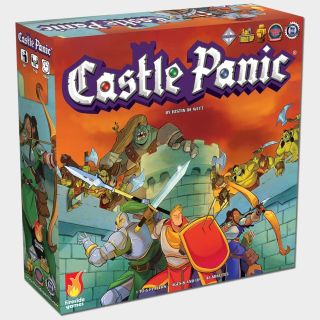
Tower defence is a simple gameplay mechanic, but this colorful co-op game leverages it to great effect. Your job is to hold off a horde of orcs that are marching on your castle, and it's surprisingly engrossing.
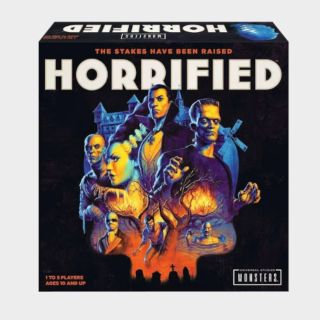
This game is a master of tricky choices. Do you try to stop a monster once and for all or save the civilians who are in harm's way? It's a compelling dilemma powered by gameplay taken from the best co-op board games.
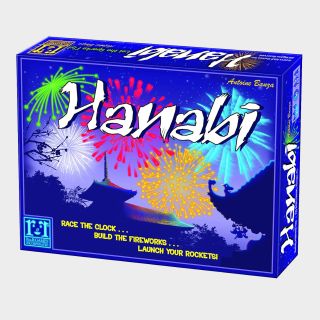
I'm not sure I'd ever played a game like Hanabi when I first tried it; it's a highly novel challenge where you have to place down numbers in the right order… and everyone can see your cards but you.
Best cooperative board game for kids
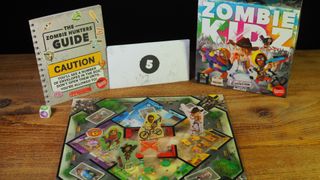
Specifications
Reasons to buy
Reasons to avoid
This cooperative board game might have one of the best elevator pitches here. Zombies have invaded your school, and you've got to fend them off to avoid eternal detention with the undead. Fun, right? The game is too. It's quirky, light-hearted, and keeps players hooked with a steady stream of secret upgrades.
Despite not being scary, though, this will probably be too much for younger kids. Bear that in mind before adding it to your collection!
✅ Your kids want something more involved: This 'Legacy' style game is a real step up in terms of complexity (and fun, let's be honest) over staples such as Monopoly, Sorry, and Clue.
✅ You don't want a five-minute novelty: Players are constantly leveling up in Zombie Kidz and unlocking new abilities, so your children will keep coming back to it rather than getting bored after a couple of matches.
❌ You're buying for very young children: Due to the more complex nature of Zombie Kidz Evolution, very young players will have a hard time getting to grips with it.
❌ You think the zombie theme may be too scary: Even though it's all very silly and there's a distinct lack of brain-eating, this may be too much for kids who are scared of zombies in the first place.
Features & design: Zombie Kidz Evolution challenges you to lock down your school by defeating these shambling monsters and keeping each of the four entrances locked down. If all zombie tokens enter the board, it's game over.
This is basically a 'my first Legacy game,' too. Thanks to unlockable abilities that carry over from session to session (not to mention stickers for tracking it all), Evolution should stay interesting for the long haul. Considering how some of these changes involve 'Super Zombies' with gnarly powers and weird new player abilities, it shouldn't get boring any time soon.
In much the same way, it shouldn't spook your little ones. This is a very friendly apocalypse, and everything is rendered with a bubbly aesthetic that could be taken from a Dreamworks film. The component quality isn't good enough to match this, unfortunately, but there's no denying that the game has personality to spare.
Gameplay: The mechanics holding up this version of Zombie Kidz are easy and breezy. The core objective is always the same (defeat zombies and shore up your defenses so they don't overwhelm you), and that means young players should pick it up quickly. Indeed, the unlockable abilities are more of an enhancement than a breaking of the wheel; they keep you on your toes when the dust has started to settle.
It's not scary either, so don't worry about this freaking out your children. It adds some fun to the apocalypse with a cartoon artstyle and no mention of brain-eating anywhere. When you add in 'weapons' that are Nerf blasters and toy lightsabers, Evolution feels more like it's happening in the kids' imagination than real life.
It's a shame that the game's components aren't as sturdy as those toys (a must for all board games for kids), but that's the only complaint I have.
Criteria | Notes | Score |
|---|---|---|
Game mechanics | This game is pitched just right for kids who want to graduate beyond simple games such as Mouse Trap. Its system is straightforward, yet compelling. | 4 / 5 |
Accessibility | It's a bit more involved than other children's games, but Zombie Kidz isn't that hard to understand. The way it introduces new ideas step by step helps. | 4 / 5 |
Replayability | Zombie Kidz is designed to be played over and over again, so longevity won't be a problem where Evolution is concerned. | 4 / 5 |
Setup and pack-down | Despite including a few Legacy elements (sealed envelopes, stickers, upgrades, that sort of thing), Zombie Kidz Evolution isn't a faff to get going. | 4 / 5 |
Component quality | Some components may not stand the test of time, but most should hold up well against older kids. The cute aesthetic makes up for it, too. | 3 / 5 |

"If your children are ready for something more involved, Zombie Kidz Evolution hits the spot. Its Legacy mechanics keep things fresh for as long as possible, while straightforward mechanics mean it's easy to understand." Read more: Zombie Kidz Evolution review
Honorable mentions
Load honorable mentions ↓
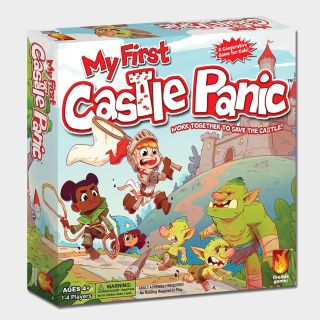
This kid's version of the excellent co-op game brings across the same excellent mechanics, but in a more accessible way. It's easy to learn, doesn't require reading, and is short enough to replay over and over.
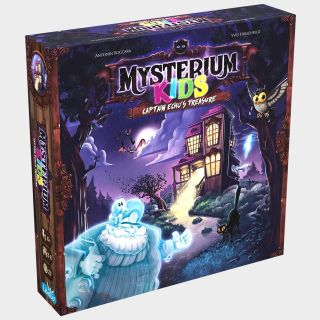
We've already given a shoutout to Mysterium for being one of the best cooperative board games, so it shouldn't come as a surprise that the kids' version would get our vote too.
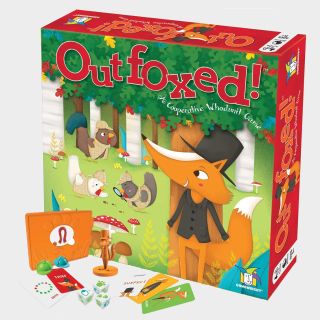
Buying for younger children? Outfoxed is just the ticket. It's a bit like Clue in that you're dashing around the board trying to find answers and ruling out suspects before the culprit makes their escape.
How to choose cooperative board games
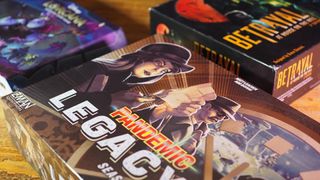
Unsure of what you're in the mood for? Don't worry, it's easy to get choice paralysis when there's so much on offer.
To help point you in the right direction, I've listed a few questions below that usually help me when I'm trying to settle on what I should play next. Alternatively, check in with our guide to the many types of board games. It's filled with suggestions that could be a fit for you.
👨👩👦 How many players are there going to be?
Although it seems like an obvious question, it's usually a good idea to start with the number of people that will be sat around your table. This removes a few options from the list and adds others, helping you narrow the suggestions down. As an example, Legacy of Isla Nublar won't be much good if you've got six people wanting to join in, because it's got a max capacity of four.
🎲 What games do you already enjoy?
This is probably the easiest way of whittling down suggestions and zeroing in on what you're up for. Do you enjoy spooky games? Mansions of Madness, Horrified, and Betrayal at House on the Hill are great places to start. Hate titles that force you to really stretch that gray matter? The Captain is Dead may not be for you, but Articulate could be a better bet. Regardless, this is why our reviews always include a 'play if you like' section. Similarly, think about the type of game you enjoy; knowing you love Legacy games gives you something else to shoot for.
🕐 How much time do you have?
Time is at a premium for many of us, so it's worth taking how long a game will take into consideration before hitting checkout. (More complicated games will also take a while to get into the swing of, frequently lasting up to double the amount of time stated on the box as you figure things out.) Not up for a multi-hour behemoth that'll take the better part of an afternoon to finish? Knowing this helps you steer clear of chunkier games like Unfathomable. To make things as easy as possible, I've listed how long an average session lasts in the specs section of each entry on this page.
❓ Who are you buying for?
Shopping for someone else, family, or a group? Having a quick think about the intended audience can really help push you in one direction or another. If you're , but thinking about who you're buying for can be helpful. Are you shopping for someone who loves fantasy stories and adventure RPGs? Try something like Gloomhaven, or Descent. Are they a big Star Wars fan, on the other hand? Give Imperial Assault a go.
How we test cooperative board games

Our testing methodology is of tremendous importance to the 12DOVE team; we're in the privileged position of recommending board games for you to spend your hard-earned money on, so we take the matter seriously.
As mentioned in our 'how we test board games' guide, our experts have years of experience covering the industry and will spend as long as they can with a product to learn its ins and outs. They'll also run the game multiple times with different player counts too, just to see if or how the experience differs.
When it's time to put pen to paper, we then split the critiques found on this page into four distinct sections:
- Introduction: We discuss the game's 'elevator pitch' (e.g. what is its unique selling point?) here, and you'll find at-a-glance buy if / don't buy if advice nearby.
- Features & design: This is where we discuss how the game works, and what its components or visual style's like.
- Gameplay: Most of our writing is dedicated to a cooperative board game's mechanics, so expect the bulk of a review to discuss whether the product is actually fun to play.
- Should you buy: Seeing as co-op board games can be expensive, this section aims to give an honest overview of whether the item is worth purchasing. 'Buy if/don't buy if' boxes are also included here.
We also rank cooperative board games with a standardized set of criteria you'll find on this page and across our reviews. This includes everything from how accessible it is to the component quality. You can see an example below:
Category | Notes | Score |
|---|---|---|
Game mechanics | Will you actually enjoy playing? We weigh in. | ? / 5 |
Accessibility | Is the game easy to get into? | ? / 5 |
Replayability | We discuss how much longevity a game has here. | ? / 5 |
Setup and pack-down | Will it take a long time to set up or put away the game? | ? / 5 |
Component quality | Are the pieces going to stand up to punishment? You can find out in this section. | ? / 5 |
If you'd like to get a better idea of how our process works, be sure to visit the wider 12DOVE review policy.
Cooperative board games FAQ
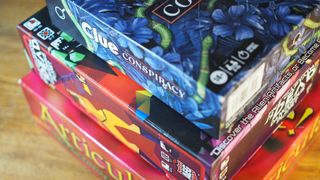
What is a cooperative board game?
At its most basic, cooperative board games challenge you to work as a team (either with all the other players or just some of them) rather than alone. Usually, you'll win or lose as a group; you share an objective.
The majority of the time, co-op board games task you with gaining more points than a rival group - as seen in Articulate - or completing a certain task before your time is up, as per games such as Horrified.
Pandemic is another great example of a good team game. This race against time is about saving the world from disease, so it's vital that you communicate and strategize about what to do next together – otherwise, you'll be overwhelmed. Lone wolves are almost guaranteed to lose.
That's what good co-op board games are all about: working as a team to overcome a challenge you couldn't tackle alone.
Where can I get cheap cooperative board games?
Co-op board games can be expensive, but it is possible to find good discounts if you know where to look. You can see our top picks based on region below, or head to our dedicated page of board game deals for individual offers we think are worth your time.
US
- Amazon: Best for variety overall
- Target: Can get exclusive products
- Walmart: Pretty good discounts
- Miniature Market: Reliable hobby game deals
- Best Buy: Decent for family games
UK
- Amazon: Best for variety of deals
- Magic Madhouse: Has regular, good offers
- Zatu: Lots of deals on hobby games
- Argos: Reductions on classic family games
- Very: Decent family game deals
- John Lewis: Good deals on all kinds of games
Should I wait until Black Friday to buy cooperative board games?
Want to make sure you aren't out of pocket when shopping for the best team board games? It's worth keeping an eye on the annual Black Friday board game deals or Prime Day board game deals, especially if you're hunting down more expensive hobby games. These usually - but not always - get their biggest reductions then.
More family-friendly titles are different, though. They enjoy price cuts all year round, so (after years of covering these sales), I wouldn't say there's any benefit to waiting. If you want to work out whether something is a good deal or not, drop in on price-comparison software such as CamelCamelCamel.
If you're preparing for a get-together and aren't feeling like working as a team, don't miss our guide to the very best party board games. Want a different kind of co-op experience, on the other hand? Be sure to check in with the best tabletop RPGs.
Sign up to the 12DOVE Newsletter
Weekly digests, tales from the communities you love, and more

I've been writing about games in one form or another since 2012, and now manage 12DOVE's tabletop gaming and toy coverage. You'll find my grubby paws on everything from board game reviews to the latest Lego news.
